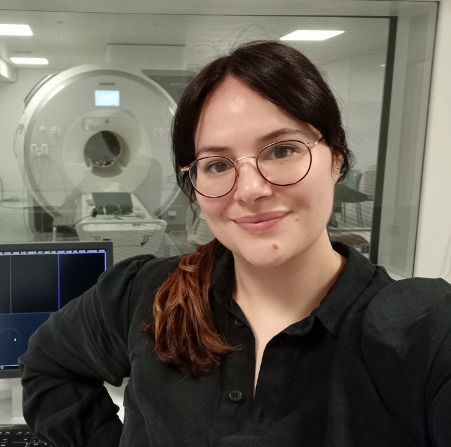Micol Avenali

Micol Avenali is an Assistant Professor of Neurology at the University of Pavia, Italy. She works as a neurologist and researcher at the Parkinson’s Disease and Movement Disorders Unit -IRCCS Mondino Foundation of Pavia. She is involved in several national and international research projects as PI and collaborator. From 2021, she coordinated the “Parkinson e Microbiota” Project on the role of the microbiome in the development of Parkinson’s Disease.
Laura Crucianelli

Laura Crucianelli is an Assistant Professor in the Department of Biological & Experimental Psychology at Queen Mary University of London. Previously, she was a Research Fellow at the Department of Neuroscience, Karolinska Institutet in Stockholm, Sweden. She investigated affective touch and temperature perception, interoception, and sense of body ownership in healthy and clinical populations. She published over 40 scientific articles and in 2021, her science communication essay “The Need to Touch” was published in Internazionale. In 2022, she participated in the TEDXLakeComo with a talk titled “The Language of Touch”.
Benny Van Der Vijgh

Benny Van Der Vijgh is a senior researcher at Altrecht, Netherlands. His background includes both clinical psychology as well as neuroscience and AI, aimed at investigating eating disorders in a multidisciplinary approach. Within this line of research, he combines psychophysiological measurements with behavioral data and other measurements to gain more insight into how stress influences the course of an eating disorder and to develop new interventions aimed at mitigating this influence.
Eric Guerci

Eric Guerci is an Associate Professor of economics at the University of Nice Sophia Antipolis, UNS GREDEG (Groupe de Recherche en Droit, Economie et Gestion) Nice, France. Marie-Curie European research grant, he spent two years at the CNRS GREQAM Economics Research Group in Marseille. He then continued his career in France by becoming an Associate Professor of economics at the University of Côte d’Azur, where he is currently also deputy director of the Experimental Economics Laboratory. Since 2021, he is the promoter of the Sociobiome Project.
Lauren Fiechtner

Lauren Fiechtner is the Director of Nutrition, Division of Gastroenterology and General Academic Pediatrics, MassGeneral for Children, and Assistant Professor of Pediatrics at Harvard Medical School. Dr. Fiechtner’s interests include preventing childhood obesity in the community and improving care for patients with oral aversion and feeding difficulties. She has presented her work at the Pediatric Academic Societies, the Obesity Society, and the North American Society for Pediatric Gastroenterology, Hepatology, and Nutrition annual meetings. Her work has been published in the American Journal of Public Health, Childhood Obesity, Preventive Medicine, and Journal of National Medical Association.
Andrea Frontini

Andrea Frontini is the Associate Professor of Human Anatomy (BIO/16) at the Department of Life and Environmental Sciences, Università Politecnica delle Marche (UnivPM), Italy. His main research topic is molecular mechanisms involved in the control of energy balance. This includes central mechanisms of action in the hypothalamus but also peripheral signaling pathways in adipose tissue, muscle, and liver. He is interested in the biology of adipose tissue in physiological as well as pathological conditions such as obesity and diabetes. The results of his research work have been published in 63 peer-reviewed international journals. Google Scholar: h-index: 39; i10-index: 51; citations: 9436. Scopus: h-index 36, citations: 6480.
Sahib Khalsa

Sahib Khalsa is the Director of Clinical Operations at the Laureate Institute for Brain Research and Associate Professor at the University of Tulsa. Dr. Khalsa’s work as a physician-scientist aims to delineate how interoception influences mental and physical health, using innovative physiological probes to study heart-brain and gut-brain communication. Central aims of this work include discovering modifiable neuroscience-based targets to improve the treatment of psychiatric disorders such as anxiety and eating disorders, as well as medical conditions affecting the gastrointestinal and cardiovascular systems.